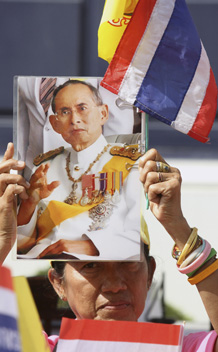More Reading the Wikileaks Cables: Thailand’s Monarchy
More on:

The latest bunch of released Wikileaks cables, online at the Guardian’s archive, offer fascinating insight into Thailand’s opaque monarchy, and should put to rest, once and for all, any idea that the royals stay out of politics except for occasions of national emergency, such as the bloodshed of 1992.
Theoretically, Thailand’s monarchy is “above politics” – the royal institution does not involve itself in political life, and is theoretically a constitutional monarch, like Queen Elizabeth II. Of course, Thais and experienced Thailand watchers know this is not the case; Thailand scholar Duncan McCargo, at Leeds University, coined the term “network monarchy” to explain how the palace influences politics through a network of its supporters and loyalists. But the recent batch of leaked cables show in much more detail how directly the monarchy intervenes in Thai politics, and how much more regularly it intervenes than some Thai observers thought. The royals are hardly saving their powder for occasional instances of dire national emergency. In one cable, a former Thai prime minister, Samak Sundaravej, tells US officials that Thailand’s Queen Sirikit pushed for the 2006 coup against former prime minister Thaksin Shinawatra, and also backed anti-government protests by groups that had demonstrated against Thaksin. In another, senior Thai officials tell American diplomats that Thailand’s king “explicitly told [army commander] Anupong Paojinda not to launch a coup” in 2008, two years after the previous putsch.
Though these cables will be blocked from servers in Thailand, and Bangkok-based newspapers and bloggers will refer to them without referencing the royal family, for fear of being charged with lèse majesté, undoubtedly many Thais will find out about them, just as they have found out about most other stories about the royal family. Of course, Thailand’s government will officially ignore them. But eventually, it will have to address their substance. In yet another cable, senior Thai officials express dismay to the US ambassador at the eventual transition to Thailand’s crown prince, whom they hint is flighty, womanizing, and unsuited to rule. When he finally takes over the palace, if Thailand has not crafted a better way to contain the monarchy’s influence, there could be major trouble.
More on:
 Online Store
Online Store